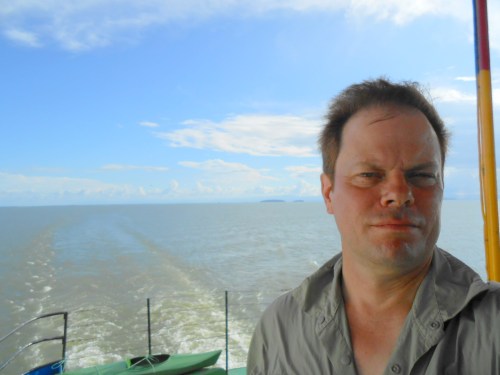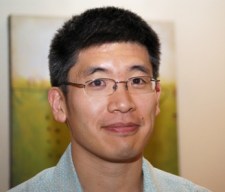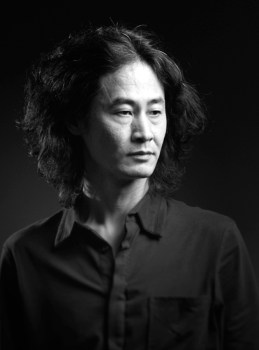.
Happiness
IT WASN’T LIKE they’d been invited, but when they saw that house in the distance, they left the highway and took the dirt road that led to it. Nor were they accustomed to dropping in at strangers’ homes, but the fact was the long trek from Belize to Guatemala, the hours it’d taken to cross the border—as if the young couple traveling in a camper with the young man’s father were suspicious—had left them hungry and thirsty. If they drove up to the house it was to ask where they could eat. As they neared the structure of amber wood, evidence of the occupants’ life comforted them: a bicycle tossed on the grass, a tire swing hanging from the branch of a tree, sheets hung on a line. The sound of their motor attracted the attention of the inhabitants. First the children, then two small blond women and then a man with a long beard came onto the porch and smiled as if they had been expecting the visit. The couple and the boy’s father got out of the cab and the latter took the lead, greeted them in a mix of English and Spanish and quickly discovered English was the language to communicate with that friendly family. Rose, Wendy and Bob introduced themselves and gestured at the children, indicating that they were Wayne and Stephanie. The man and the young people also introduced themselves and then explained that they were looking for a place to eat, if they could give them directions, but Rose, Wendy and Bob immediately insisted that they were their guests, they were making lunch and would be delighted to share it with them. They emphasized the words “share it” and among the three exchanged glances as when a husband and wife consent to a decision taken on the fly, without consultation. Rose, who was wearing an overall which exposed her shoulders crossed by the turquoise straps of a bikini, directed the children, by way of giving them the news: we have guests, set three more places at the table. The children, without copying the welcoming smiles of their parents, said, yes, Mamá, and with looks of annoyance went into the house. Wash your hands, Wendy ordered, lost within a shimmering red dress. Yes, Mamá, the children answered without enthusiasm. The young couple exchanged a fleeting look, trying to disguise their discovery without being able to say a word; only confirming their suspicions by squeezing each other’s hands. They’d heard about communes, different ways of living together, thought they knew all about it, thought they owned the word “freedom” (maybe this trip derived from such a conviction) but now they were witnessing a lifestyle that embodied that word. When they were seated at the table, a bowl of salad was passed around, accompanied by rice with carrots, squash, sprouts, beans and eggs, the main course. They were vegetarians, they said, smiling; they were sorry not to be able to offer anything else, but the eggs supplied protein, Wendy said, and the legumes, the lentils and beans they mixed with the rice. The boy’s father, who traveled with a plethora of vitamins and minerals lined up each morning like beads on a string, endorsed Wendy’s nutritional knowledge and said that in addition these were foods rich in lecithin and nobody took lecithin into account.
During the meal, while Wayne and Stephanie opened their mouths and showed the guests their chewed balls of vegetable protein when their three parents weren’t looking, the young pair and the boy’s father learned their hosts had moved to Orange, Belize five years ago. Before the children were born, the three took a trip to Tikal and were convinced that Central America was the place to start a new life, far from the conventions of capitalism and hypocrisy, with the mystic force of the native cultures. They found a bit of land they rented from a British relative of Rose’s stepmother, and as it was very complicated to explain that, they summed it all up. Here they were, they had chickens, they made soy cheese, ground wheat and corn to make bread, grew fruit trees because vegetables were difficult; the climate didn’t permit tomatoes, for example. They said it rained a lot. We have beehives, Rose informed them when she served the dessert, and it was she who took care of the bees; the guests had to try the mango blossom honey. And she passed the pot with its dense aroma so the guests could pour the divine product over the mangos of their orchard.
The young couple kept exchanging glances; they had arrived in a place as sweet and yellow as the flesh of the mango that they lifted to their mouths in juicy bites. They were eighteen and on the point of deciding what to do with their lives. In the light of that golden well-being, their world seemed made of asphalt and motor noise, too much clothing and too many school exams: insipid routine. The boy’s father talked enthusiastically, asking about methods of cultivation, how they made compost, collected water. He’d just sold his automobile wheel factory and had bought the camper to explore his new life. He’d invited the couple to come along on this journey of recovered freedom, if indeed he ever had freedom, he told them when he spoke of his plans. Wanting to be together and on the road, they readily joined the father’s curiosity and imagination, felt an astonished and joyful complicity with that man twenty-five years their senior. They supposed it was his attitude about the trip and adventure that excited them. They didn’t realize that they shared the same question—what was happiness?
When Rose, Wendy and Bob invited them to see the water reservoir which supplied the house, and which they drank after boiling, the three were elated by the goodness of the paradise their hosts had built. One could live isolated, eat well, laugh and love each other, create a home. The young couple walked slowly in the tropical heat, seeking refuge in the shade of trees on the path. The children got on their bikes and sped by, splattering them with mud from the puddles. But all that was fine. Much more than taking the camper through the middle of the city, much more than the parties where they danced and drank, much more even than going to La Marquesa and climbing to Cruz Blanca at nearly 13,000 feet. Here they were more together. The boy said his friend Aldo would be happy to go with them. She understood his meaning: the three of them could be hand in hand and sleep curled up in the same bed of the camper if need be.
As if to demonstrate he was versed in engineering issues, Bob explained how the water drained down the sides of the pond and how it was fed into another lower reservoir from which it was piped into the house. The gradual slope and quantity of rain were ideal. If the reservoir overflowed, the canals they’d designed carried the water as far as the orchard and then the river below. Under that high sun, the children took off their rubber boots and stripped rapidly to throw themselves into the pond. Bob watched them with satisfaction: the water’s fresh and irresistible, he informed the guests as if he were the narrator of an ad. And he also sat on a stone to take off his shoes. Wendy and Rose joined forces to advise the guests to swim: they had to refresh themselves before getting back on the road. The young couple looked at each other again because they’d left bathing suits in the camper, but their hostesses had already taken off the red dress, the overall and blue bikini, and Bob his pants and t-shirt. He didn’t wear boxers. How annoying they are, he said, when he saw that the boy’s father lingered in his briefs before exposing himself completely. The girl looked at her boyfriend, hesitating. They were still protected in their pants and tee shirts, and even worse, lacked the skill to undress quickly and fling themselves into the coolness with the naturalness of their hosts. The boy began: took off his tennies and shirt, and she, without looking at the boy’s father out of modesty, rushed to take off her playera, bra and finally her pants and socks. When she saw the boy going ahead to jump into the water, she tossed her clothing carelessly on the grass. Alone and naked on the shore she felt destitute. Running after him more as a chore than for pleasure, she submerged herself in the water that revealed their bodies. She looked for the boy because she needed his protection, but it was Bob and Wendy who swam to her side and bragged about the benefits of bathing in their crystalline water. Rose emerged naked and round on the shore, the sparse down of her sex dripping, her breasts pink and large, while the boy and the girl, separated, avoided looking at each other. The women shouted to Wayne not to urinate, which he was doing in a sumptuous arc, on the water where everyone was swimming. And Wayne took off running after his sister.
The young couple began to feel comfortable in the water, in front of the others. As Wendy went over to Bob and embraced him sweetly, as Rose hugged Wendy, as Bob kissed them each tenderly, and then gave them a pat on the butt when they moved away, kicking toward the boy’s father, the shame of nudity seemed to abandon them. It was a thing of the past, of the shore minutes earlier. Submerged near the shore the boy’s father needed a little push, Wendy and Rose said, challenging him to a race. Then he, without saying a word, left his reserve and set out swimming, leaving them far behind while the young people looked at his white rear emerging from time to time. The two women revenged his triumph by splashing him, and then warmly embracing him. Rose kissed him on the lips and swam across to Bob, who laughed while Wendy boldly kissed the guest. The young couple got closer together, there in that water, whose muddy bottom they dipped toes in. They didn’t go near the others, although Bob called them to where he and Rose were playing. He cupped water in his hands and let it fall over her breasts. The young couple weren’t prepared to share their nudity with others; it was enough to feel their submerged bodies beating with a pulse that hadn’t ever manifested like this before: in the midst of a liberty without restrictions, a naturalness like mango flesh. They kissed their wet mouths and his erection brushed her thighs. They’d made love before the trip and during it had dared to while the boy’s father slept in the upper bunk, and also when she stretched out in the back bed, because the tight curves had made her carsick.
This time, with the laughter and nearness of the others, they discovered secret, prohibited sex. There was something public and private in that rubbing under the water; their nakedness, no different than that of the others, excited them. They didn’t talk to each other nor let Bob coax them over; there was enough mystery between them to add something new. The children came back asking that one of the parents peel them a green mango and fix it with lime and salt. Rose moved away from Bob, Wendy from the boy’s father, and Bob stopped calling the young couple and started getting out of the water to take care of the kids. No help for it, he said, and invited the others to eat green mango. He’d wait for them on the porch. He walked his naked, hairy body in front of them all and only the girl looked at it openly. The nakedness of men was something recently added to her experience, and she compared the sex of the boy with that of Bob, who had not been circumcised. The pubes of Wendy and Rose, whose rosy bodies passed near them to get dressed and help with the green mango ritual, didn’t provoke the same curiosity in her.
They didn’t notice when the boy’s father got out to get dressed. Now that only they remained, they wanted to stay, oppose themselves to the rest and the children, kiss each other rabidly because they had participated in a definition of happiness they hadn’t known before. They didn’t know if they wanted it for themselves or if the boy’s father would adopt it.
They said goodbye to Bob, Wendy and Rose, and the children Wayne and Stephanie, who ran next to the camper along the dusty stretch of road, throwing dried mango pits, irritated by that world of smiles and living in harmony, of rice with vegetables and pond water, of nakedness and shared bodies, of Papá and Mamá and Mamá and we love you very much, of that way of being happy. The couple looked at the approaching highway. They paid no attention to the sound of pits striking metal, had their hands interlaced as if to protect them from the need to find answers. When they reached the asphalt and the camper slid along smoothly, the boy’s father broke the silence: good people those Dutch. They didn’t respond, only abandoned themselves to the serpentine road in the midst of the luminous green of the countryside.
.
The Textbook Case
……..for Emilia
HAVE YOU EVER dialed a wrong number? I’m talking about when you’re stressed because you’re not going to get to an appointment on time and then in the car, at a red light, trying to keep the traffic cop from seeing you, you open your day minder, quickly punch in the number of the person you’re going to meet? Since he doesn’t answer, she leaves a message on his cell: “I’ll be there in fifteen minutes, wait for me.” Relieved, she drives to the meeting and there he is with the documents that have to be reviewed so that her paper can be considered for the conference, the first in her anthropology career: “Single mothers in middle class neighborhoods of the city.”
Has it happened that you don’t even realize you’d left a message on a wrong number because the person you had the appointment with doesn’t mention the call and has simply waited the fifteen minutes imposed by familiarity with city traffic? She parks and apologizes before sitting down, but he has no complaints because after all, he’s been comfortably waiting in a café while she’s been the one driving and dodging through traffic, her mind racing like the motor of the car. They begin immediately to review the objectives she had posed for the research: he’s a member of the committee that selects presenters and had been her professor besides. He knows she’s brilliant. During the discussion, her cell vibrates within her jacket pocket; she feels it because she didn’t take the jacket off. She wouldn’t have answered it anyway, because she doesn’t like to be interrupted. She knows when she should take a call and when not to. This isn’t the time. Warming up by her second coffee, she sheds the jacket, so doesn’t feel the insistent vibration–like a dentist’s drill—demanding an answer.
§
She’s back home before she realizes that she has five calls from the same number. The number hasn’t been registered under a name—it would have shown on her screen. There’s a message. “What do you want? Stop bothering me.” The number appears to be similar to her professor’s, which she’d called when she was going to be late. She checks the call and confirms it. But it isn’t her professor’s voice. It’s someone else who answered her call while she was in the café. The voice is unpleasant; she listens to it again. The “what do you want” is loaded with irritation. While she searches for the professor’s number to see what the error was, someone leaves another message. She listens to it: “I told you not to call me.” It’s the same irritated male voice. The insistence angers her and she thinks how absurd it is that an attempted apology set off this series of calls. When she gets a call from someone she doesn’t know, she simply doesn’t bother to answer it. To do this, someone must be very lonely. At best, it’s a message in a bottle washed up from the sea, like in the story she read by some Bernardo Ruiz, where a girl calls numbers at random from prison to see if someone sometime will answer from the outside. And someone does.
§
She fixes dinner: a sincronizada, grilled tortilla sandwich with lots of salsa and beans. She’s happy with the professor’s comments: it’s likely that she’ll be chosen to read her paper at the conference. She feels good, like when she made paper boats with her father and blew on them so they’d sail in the fountain at the park and the boat didn’t fall on its side, but kept going straight. As she sits to eat, the cell phone buzzes. She’d put it on vibrate, and on the table the sound resembles a compulsive cicada. That’s what her mother says: “Answer your compulsive cicada already.” She’d never seen a cicada. Her mother said they were big, ugly, nocturnal insects. That their looks match the disagreeable sound they make. She answers without thinking, and the voice at the other end scolds her: “I told you to never leave me messages.” She thinks about the cicada’s appearance; suspects this man has a wart on his big nose. “Look, mister, I don’t know who you are. I called a wrong number,” she says, liberated and looking at the sincronizada on her plate. “I made a mistake,” she mutters in an exasperated tone after a silence. The cicada seems to have realized he doesn’t know her voice. Another silence; she’s on the point of hanging up but he finishes with: “Then don’t go around making mistakes, stupid,” and hangs up. She returns to her lukewarm dinner. Now on top of feeling guilty for arriving late to her appointment, she’s supposed to feel bad for having dialed a wrong number. She has the urge to call the imbecile back and tell him that surely he’s never made a mistake. He’s never confused a two with a seven, which is what happened to her.
§
Has it ever happened that the mistake you made kept coming back? That once you’ve sighed the relief of confusion clarified and begun to forget the voice of the bothersome, disconcerting cicada, and are in bed reading the novel that lulls you to sleep, the phone rings again and you find that at such an hour (when normally only family or your partying friends would dare to call) the wrong number is calling again? She doesn’t even consider answering. If it wasn’t clear enough and he can’t stand getting an erroneous message, then he should see a shrink, give that a shot, just stop bothering her. She mutes the phone and sleeps. The next morning its red blinking makes her realize there’s a message. She sighs, reluctant to listen to this intrusion. She thinks the word and it seems curious to qualify someone who calls that way, because actually she was the one who inserted herself into a stranger’s life, by bungling a simple courtesy call.
§
While drinking her coffee on the edge of the bed she listens to the message. “Slutty woman, leave my husband alone. Damned whore.” The strange voice is fraught with aggression. It’s astonishing that her misdialing has resulted in all this. She supposes that it’s the old, where there’s smoke…or she fit like a glove in the wrong place at the right time, someone’s tail has been stepped on…She’s upset, making explanations in proverbs like her grandmother. She wants to call the woman and shout at her that she’s done nothing, that they need to leave her alone, that their fights are their problems and if her husband is despicable, they have to deal with it themselves. She clears herself with those words with which she would like to pierce the idiot’s ear. Then she starts thinking about how absurd the situation is and how laughable. What if she calls and says to the man: Look, I already told you I called your number by mistake, straighten things out with your wife but don’t put me in the middle of it? She imagines him explaining: “Sweetheart, honestly, the girl called by mistake. She can tell you herself.” He hands over the phone. She says: “I’m Elsa, an anthropology student, you’ve mistaken me, ma’am, and I’m neither a whore nor do I get mixed up with repulsive cicadas, and even less married ones. If you are not disgusted by your husband I am.” And the wife replying: “Ah, you know him? Don’t think that I’m going to believe you, dead mosquito. It doesn’t matter to me whether you study seals or whistles, don’t students fuck? Or do books inhibit sex?” She wasn’t going to bare her breast for the other woman to unload on. She didn’t want to begin her day that way, fed up to here, or better yet, up to her ass, in the middle of the bed of Mr. & Mrs. X.
§
Haven’t you done the same out of sheer exhaustion? On the tenth message from the wife infuriated by the infidelity of her husband, by her jealousy justified or not, after receiving insult after insult each time more obscene, more grotesque, wouldn’t you opt to put an end to the situation? Of course, she could have shut off the cell, asked for a change of number. But she thought she shouldn’t have to be made the victim of the game and suffer the consequences: having to advise everyone that her number’s changed, especially the professor who should call her in the next few hours. And no way he ought to get that “the number you called is no longer in service” routine. The messages have intensified so drastically that she thinks only confronting the gross, obscene woman will resolve things. So she answers the tenth call in the afternoon and tells the woman they can meet in the Vips on Revolution. Sufficiently far from her house. She will explain who she is and why the woman should leave her in peace. Perhaps the two of them can get a load off their minds.
§
She sits at the table nearest the entrance, as they’d agreed, and orders a coffee. She doesn’t like the coffee in that place but only wants to pass the time and calm her nerves. She doesn’t know how she’ll react when she sees the enemy: what’s the woman like, with her shrieky voice and beside herself? Short? Curly hair? Does she have a big nose? Doesn’t wax her moustache? Dresses in loud colors? By the jealousy, she supposes the wife’s neither very young nor very old. Forty-something, she thinks. Typical case of the husband who betrays her with young women because her fading looks and domestic preoccupations have killed his appetite. Typical case. She, young, nice-looking, tall, a bit plump but acceptable, fell into the middle of a textbook case (so says the professor). If the jealous wife sees her, she won’t doubt that her husband has been having an affair. The thought floors her. She looks at her watch: the fifteen minutes have lapsed. The woman ought to be there already. She looks around: tables with couples, groups of women, two men, a family, various young people. She realizes that she’s the only woman by herself in the place. The cell rings. She recognizes the number and answers cautiously. Nobody speaks on the other end. She looks around thinking that a cell at the ear would allow her to discover the accuser. She feels afraid. Better to go.
§
Wouldn’t you have done the same? Now she doesn’t want to face the person who has not appeared. She’s been naive. The textbook case doesn’t end like this. Go. She leaves quickly after paying and stamping the parking ticket, looking around as if she were guilty of something. Not wanting to run into the woman who was perhaps just calling to say she was late. But the voice didn’t speak. Would she repeat the situation that started this distasteful appointment in the first place? She gets in her car and goes down Revolution, takes Rio Mixcoac to her house: she’ll get home and throw the cell in the trash. She’ll send her professor an email, trying to make sure he doesn’t think it’s just a way of trying to find out the committee’s decision; she’ll say her cell’s not working, that she missed anything if he called or texted her. If there was anything, of course; and then she’d tell him what happened as a result of her appointment, the textbook case…
§
The last two blocks seem interminable; she turns, parks in front of the house and when she starts to get out of the car it hits her. Noticing a car parking behind her, she’s struck by an urgent need for safety. Instead of walking away, she runs to the front door of the house. She goes in and, without lighting the lights, closes herself in her room. Then the cell rings again. She knows that if she looks out the window, a woman will be standing on the sidewalk with a phone to her ear. She moves the curtain and peeks out. The woman’s a tall redhead. And determined. The cell continues to ring. She has no reason to get rid of it now.
— Mónica Lavín, translated from the Spanish by Patricia Dubrava
.
Mónica Lavín is the prolific author of short stories and story collections, including Manual para enamorarse, 2012. Her novels include Yo, la peor, about Sor Juana Inés de la Cruz, which won the Elena Poniatowska Prize, 2010. Lavín has also won the Gilberto Owen National Prize for Literature among other awards. www.monicalavin.com.
§
Patricia Dubrava is a writer and translator whose translations from Spanish include stories by Mónica Lavín in Metamorphoses, Reunion: The Dallas Review, K1N, Lunch Ticket, and Norton’s Flash Fiction International, 2015. Most recently, in 2016, Lavín stories have appeared in Aldus Journal of Translation and Mexico City Lit. Dubrava blogs at www.patriciadubrava.com
.







 Bojan Louis reading.
Bojan Louis reading.





























 Art work by Greg Mulcahy
Art work by Greg Mulcahy













